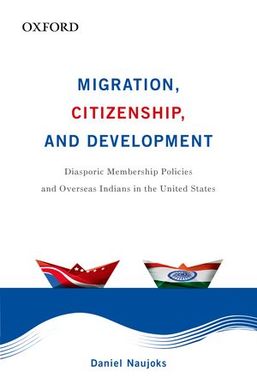
MIGRATION, CITIZENSHIP, AND DEVELOPMENT
Diasporic Membership Policies and Overseas Indians in the United States
by Daniel Naujoks
In the post-globalization world, many countries conceive special citizenship policies for emigrants and their descendants, their so called diaspora. The book Migration, Citizenship, and Development examines the effects of country-of-origin citizenship on the Indian diaspora in the United States and return migrants in India. It explores how the Overseas Citizenship of India affects remittances, investment, philanthropy, return migration and political lobbying. Using an inter-disciplinary approach, the book combines political concepts of state power and governance, sociological categorizations of behavior and identity, and economic scholarship on remittances and development. The author examines how a legal status shapes national and transnational belonging and how citizenship in the country of origin influences naturalization and attachment to the country of residence. He does this both through new conceptualizations as well as original empirical evidence about the causes and effects of diasporic activities.
Features
This website
This website provides an overview of who should read the book, how it can be used in courses, and what other voices say about its findings and conceptualisations.
Diasporic Membership Policies and Overseas Indians in the United States
by Daniel Naujoks
In the post-globalization world, many countries conceive special citizenship policies for emigrants and their descendants, their so called diaspora. The book Migration, Citizenship, and Development examines the effects of country-of-origin citizenship on the Indian diaspora in the United States and return migrants in India. It explores how the Overseas Citizenship of India affects remittances, investment, philanthropy, return migration and political lobbying. Using an inter-disciplinary approach, the book combines political concepts of state power and governance, sociological categorizations of behavior and identity, and economic scholarship on remittances and development. The author examines how a legal status shapes national and transnational belonging and how citizenship in the country of origin influences naturalization and attachment to the country of residence. He does this both through new conceptualizations as well as original empirical evidence about the causes and effects of diasporic activities.
Features
- Examines the mechanism and effects of country-of-origin citizenship
- Discusses naturalization through issues of multiple belonging, political activity and immigrants' income
- Explores special citizenship policies for emigrants and their effects on remittance, investment, philanthropy, political lobbying, and return migration
This website
This website provides an overview of who should read the book, how it can be used in courses, and what other voices say about its findings and conceptualisations.

Migration, Citizenship, and Development — Table of Content
Introduction
1. The Indian Diaspora, Diaspora Policies, and Overseas Citizenship of India
2. The Conceptual Framework of Migration and Development
3. Determinants of Status Passages: Becoming a US Citizen and an Overseas Citizen of India
4. The Rights Effect: Enabling Rights and Expectations
5. The Identity Effect: The Intangible Benefits of OCI
6. The Naturalization Effect of OCI
7. The Good-Will Effect
8. Action Effects of OCI on Migration and Development
Conclusion
Appendix
About the author
Daniel Naujoks is an international migration scholar who consults with various United Nations agencies on migration-related projects around the world. He teaches at the Graduate Program in International Affairs at The New School's Milano School, at Columbia University's School of International and Public Affairs (SIPA) and serves as research coordinator at the Organisation for Diaspora Initiatives, New Delhi.
For more information, see: www.danielnaujoks.com
Introduction
1. The Indian Diaspora, Diaspora Policies, and Overseas Citizenship of India
2. The Conceptual Framework of Migration and Development
3. Determinants of Status Passages: Becoming a US Citizen and an Overseas Citizen of India
4. The Rights Effect: Enabling Rights and Expectations
5. The Identity Effect: The Intangible Benefits of OCI
6. The Naturalization Effect of OCI
7. The Good-Will Effect
8. Action Effects of OCI on Migration and Development
Conclusion
Appendix
About the author
Daniel Naujoks is an international migration scholar who consults with various United Nations agencies on migration-related projects around the world. He teaches at the Graduate Program in International Affairs at The New School's Milano School, at Columbia University's School of International and Public Affairs (SIPA) and serves as research coordinator at the Organisation for Diaspora Initiatives, New Delhi.
For more information, see: www.danielnaujoks.com
